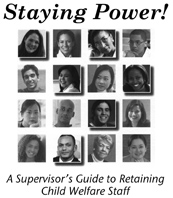 |
 |
 |
©
2009 Jordan Institute
for Families

Vol.
14, No. 1
April 2009
Tips for Developing and Retaining Family-Centered Staff
Child welfare work demands a high level of skill and often exacts an emotional toll. How can supervisors develop and retain child welfare workers who can meet the challenges and reap the rewards of family-centered practice?
Coaching
Supervisors can use coaching to enhance employee motivation, morale, performance, and retention. Family-centered, retention-oriented supervisors use coaching for growth as well as for remediation. After all, research shows that workers with higher job satisfaction want to do their best every day, want someone to encourage their development at work, and want to learn new skills (Gallup).
The following sites can help supervisors assess their coaching skills:
http://unlockit.com/docs/performance-coaching-self-assessment.pdf
http://www.envisioninc.com/resources/Performance_ Coaching_Worksheet.pdf
Rewards and Recognition
Sometimes the pace of child welfare work makes it hard for agencies to adequately recognize the efforts of employees. The family-centered practice of adapting work hours and meeting times to families’ schedules can make finding a common time to honor and recognize staff even harder.
Yet given the risk of burnout and the great responsibility they bear, child welfare staff are especially in need of validation. Following are some ways supervisors and their agencies can celebrate the efforts of child welfare staff.
Recognition should take place through small tokens (e.g., an e-mail or note recognizing hard work or an especially hard day) as well as larger gestures (e.g., a certificate at a public event). Rewards don’t need to be monetary, but some types of rewards are more meaningful than others. Most people especially value rewards that are:
- Individualized—recognition for a personal contribution they made.
- From someone they hold in high esteem—this will usually be someone familiar with their work on a day-to-day basis.
- Timely—the reward will be a better reinforcer if it comes close to the time of the good performance.
- Contingent—the reward should be related to a specific behavior or effort, rather than a generic thoughtful gesture.
- Feasible—for example, it’s not a reward to offer time off if the person’s workload won’t allow her to take time off. Better to offer a non-monetary recognition than a reward the person can’t use (JIF, 2007).
Peer Mentoring
Supervisors aren’t expected to have all the answers. Even if they do, supervisors can still benefit from letting others serve as “expert consultants.” Peer supervision and mentoring can play an important role in developing workers’ skills and in modeling the principle that “partners share power” (CPPC, 2003).
To get peer mentoring started, supervisors can ask staff to present challenging cases in unit meetings or invite workers with special expertise to offer consultation to their colleagues. Such mentoring is probably already taking place unofficially—structuring it into your unit’s schedule can itself empower and recognize staff contributions.
Peer mentoring sessions can take place in groups and one-on-one, but they should focus on strengths-based successes and problem-solving—they should not just be a place to vent. While it is a challenge for supervisors and staff to fit such sessions into their schedules, peer mentoring is worth it for the way it increases staff members’ skills, knowledge, and self-esteem.
| New Course on Preventing Turnover | |
|---|---|
The Division of Social Services is excited to announce Staying Power! A Supervisor’s Guide to Retaining Child Welfare Staff. This new three-day course for supervisors and managers explores why employees stay and why they leave, and teaches supervisory tools and practices that promote retention. Staying Power! was originally developed as part of a federally-funded child welfare recruitment and retention project at UNC-Chapel Hill that partnered with 34 North Carolina county DSS agencies. Because of the success of this curriculum, it is now available to all North Carolina counties. For class times or to register, go to <www.ncswLearn.org>. |
 |
Helping Staff Share Power
Some child welfare staff agree with family-centered principles, but have trouble applying them. As one supervisor put it, “Workers are moving toward sharing power, but they were so used to having the answers.” Supervisors can encourage family-centered practice by taking a “not knowing” stance and asking questions like those below.
| Questions for Taking Family-centered Practice to the Next Level |
|---|
One of the best ways supervisors can encourage social workers to respect, listen to, and involve family members is by exhibiting these attitudes in their discussions with workers about specific families. The following questions, which employ elements of scaling and strengths-based techniques, ask the supervisor to adopt a “not knowing” stance that will encourage workers to come up with their own family-centered solutions (Alderson & Jarvis, 2003).
Source: Alderson, J. & Jarvis, S. (2003). What’s good for families is good for workers [curriculum]. Raleigh, NC: NC Division of Social Services. |